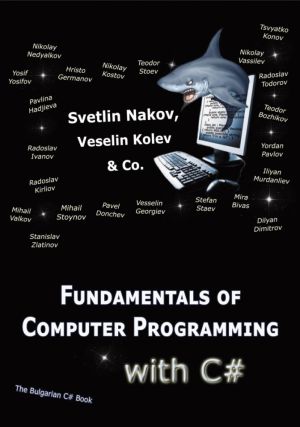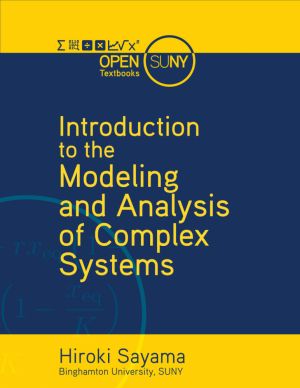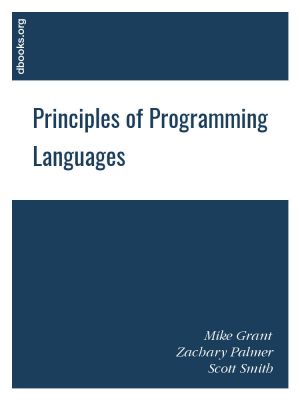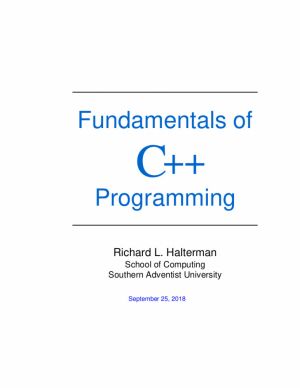Fundamentals of C++ Programming
by Richard L. Halterman
DescriptionTable of ContentsDetailsHashtagsReport an issue
C++ initially provided object-oriented programming features (see Chapter 13 and Chapter 14) and later added generic programming capabilities. C++ 's close relationship to C allows C++ programs to utilize a large collection of code developed in C.
C++ is widely used in industry for commercial software development. It is an industrial strength programming language used for developing complex systems in business, science, and engineering. Examples of software written in C++ include Microsoft Windows 8, Microsoft Office, macOS, and Adobe Creative Suite.
In order to meet the needs of commercial software development and accomplish all that it does, C++ itself is complex. While experienced programmers can accomplish great things with C++ , beginners sometimes have a difficult time with it. Professional software developers enjoy the flexible design options that C++ permits, but beginners need more structure and fewer options so they can master simpler concepts before moving on to more complex ones.
This book does not attempt to cover all the facets of the C++ programming language. Experienced programmers should look elsewhere for books that cover C++ in much more detail. The focus here is on introducing programming techniques and developing good habits. To that end, our approach avoids some of the more esoteric features of C++ and concentrates on the programming basics that transfer directly to other imperative programming languages such as Java, C#, and Python. We stick with the basics and explore more advanced features of C++ only when necessary to handle the problem at hand. 






Book Description
Bjarne Stroustrup of AT&T Bell Labs created C++ in the mid 1980s. C++ is an extension of the programming language C, a product of AT&T Bell Labs from the early 1970s. C was developed to write the Unix operating system, and C is widely used for systems-level software and embedded systems development.C++ initially provided object-oriented programming features (see Chapter 13 and Chapter 14) and later added generic programming capabilities. C++ 's close relationship to C allows C++ programs to utilize a large collection of code developed in C.
C++ is widely used in industry for commercial software development. It is an industrial strength programming language used for developing complex systems in business, science, and engineering. Examples of software written in C++ include Microsoft Windows 8, Microsoft Office, macOS, and Adobe Creative Suite.
In order to meet the needs of commercial software development and accomplish all that it does, C++ itself is complex. While experienced programmers can accomplish great things with C++ , beginners sometimes have a difficult time with it. Professional software developers enjoy the flexible design options that C++ permits, but beginners need more structure and fewer options so they can master simpler concepts before moving on to more complex ones.
This book does not attempt to cover all the facets of the C++ programming language. Experienced programmers should look elsewhere for books that cover C++ in much more detail. The focus here is on introducing programming techniques and developing good habits. To that end, our approach avoids some of the more esoteric features of C++ and concentrates on the programming basics that transfer directly to other imperative programming languages such as Java, C#, and Python. We stick with the basics and explore more advanced features of C++ only when necessary to handle the problem at hand.
This open book is licensed under a Creative Commons License (CC BY). You can download Fundamentals of C++ Programming ebook for free in PDF format (12.8 MB).
Table of Contents
Chapter 1
The Context of Software Development
Chapter 2
Writing a C++ Program
Chapter 3
Values and Variables
Chapter 4
Expressions and Arithmetic
Chapter 5
Conditional Execution
Chapter 6
Iteration
Chapter 7
Other Conditional and Iterative Statements
Chapter 8
Using Functions
Chapter 9
Writing Functions
Chapter 10
Managing Functions and Data
Chapter 11
Sequences
Chapter 12
Sorting and Searching
Chapter 13
Standard C++ Classes
Chapter 14
Custom Objects
Chapter 15
Fine Tuning Objects
Chapter 16
Building some Useful Classes
Chapter 17
Inheritance and Polymorphism
Chapter 18
Memory Management
Chapter 19
Generic Programming
Chapter 20
The Standard Template Library
Chapter 21
Associative Containers
Chapter 22
Handling Exceptions
Chapter 23
Command Line Development
Book Details
Title
Fundamentals of C++ Programming
Subject
Computer Science
Publisher
Southern Adventist University
Published
2018
Pages
766
Edition
1
Language
English
PDF Size
12.8 MB
License

Related Books

This open book aims to provide novice programmers solid foundation of basic knowledge regardless of the programming language. This book covers the fundamentals of programming that have not changed significantly over the last 10 years. Educational content was developed by an authoritative author team led by Svetlin Nakov from the Software University...

This book integrates the classic fields of mechanics - statics, dynamics, and strength of materials - using examples from biology and medicine. The book is excellent for teaching either undergraduates in biomedical engineering programs or health care professionals studying biomechanics at the graduate level. Extensively revised from a successful th...

This book offers a completely new approach to learning and teaching the fundamentals of analytical chemistry. It summarizes 250 basic concepts of the field on the basis of slides. Each of the nine chapters offers the following features:
- Introduction: Summary. General scheme. Teaching objectives.
- Text containing the explanation of each slide.
- ...

Fundamentals of Business, 2nd Edition is an 372-page open education resource intended to serve as a no-cost, faculty customizable primary text for one-semester undergraduate introductory business courses. It covers the following topics in business: Teamwork; economics; ethics; entrepreneurship; business ownership, management, and leadership; organi...

Introduction to the Modeling and Analysis of Complex Systems introduces students to mathematical/computational modeling and analysis developed in the emerging interdisciplinary field of Complex Systems Science. Complex systems are systems made of a large number of microscopic components interacting with each other in nontrivial ways. Many real-worl...

In this open book, our goal is to study the fundamental concepts in programming languages, as opposed to learning a range of specific languages. Languages are easy to learn, it is the concepts behind them that are difficult. The basic features we study in turn include higher-order functions, data structures in the form of records and variants, muta...

